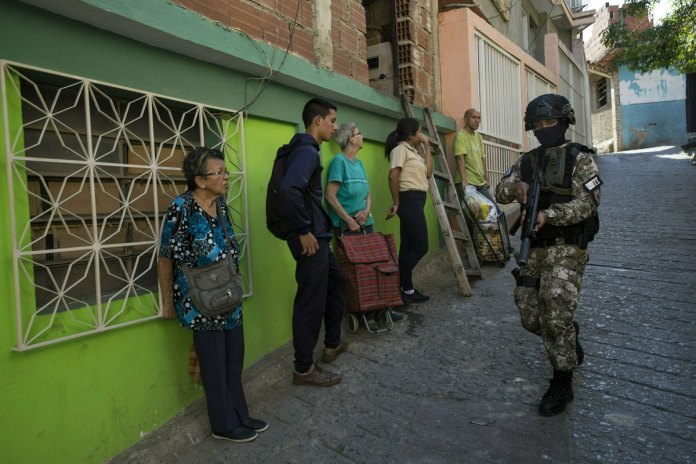Venezuela is a country where crisis has become the norm, and now, a Trump administration that has made the regime change in Venezuela a foreign policy priority, has turned Venezuela into an international conflict in no man’s land.
History seems to repeat.
The Bay of Pigs Invasion was a failed military invasion of Cuba undertaken by the CIA-sponsored rebel group Brigade 2506. The original invasion plan called for two air strikes against Cuban air bases. The main force would advance across the island to Matanzas and set up a defensive position. The United Revolutionary Front would send leaders from South Florida and establish a provisional government. The success of the plan depended on the Cuban population joining the invaders.
58 years later, Venezuelan opposition leader Juan Guaidó took to the streets with a small contingent of heavily armed troops in a bold and risky attempt to lead a military uprising and oust socialist leader Nicolas Maduro. Guaidó has been coordinating with the Trump administration since before assuming the interim presidency.
Though no troops —despite the ‘5,000 troops’ speculation— or paramilitaries were sent to Venezuela, the same erroneous thinking to oust a dictator has been assumed in both Cuba and Venezuela, 58 years apart.
President Trump has chosen a side in the Venezuelan conflict and is promoting the regime change without a plan capable of leading a transition to democracy in the crisis-stricken country.
Venezuela was once the wealthiest nation in South America, but in recent years millions have fled the country amid mass starvation and violence after socialist policies were enacted and government seized private industries. Many of them have come to relocate in South Florida.
But Venezuela became a wealthy country –and the world’s largest oil exporter– under a dictator, Juan Vicente Gomez. From 1908 until 1958, the country was ruled by corrupt military who rouse to power through coups.
In both cases –Cuba and Venezuela– people in those countries have sided with whoever represents a solution to their woes. Cubans did not join the ‘Playa Giron’ invaders; Venezuelans did not join Juan Guaidó’s uprising as expected in comparison to the large street protests Venezuela had been immersed in before.
So, moving forward, the Trump administration needs to rethink its Venezuela strategy.
As the country continues locked in a standoff between Maduro and Guaidó, both claiming to be Venezuela’s rightful president, sanctions, oil embargo, tough talks, and threats without a viable solution to democracy, will only make things worse and will leave more people in Venezuela siding with the Maduro’s regime ultimately.
Venezuelans are literally dying from starvation, and they have a socialism to thank for their economic impoverishment. Children are dying from lack of nutrition and going without medical care. They have a president (Maduro) who refuses to scrap a state-run economic model that is responsible for all the disaster.
But Venezuelans don’t have the capability to overpower him, nor will Guaido ever be able to do it by staging uprises.
As Venezuela’s crisis deepens, more and more government opponents are now on the run, facing arrest for their role in the failed military uprising to topple the regime. But instead of going into exile, or to jail as another silenced martyr of the movement to oust Maduro, many dissidents are pounding on the doors of foreign embassies in a throwback to the dark days of the 1970s, when far bloodier military dictatorships in South America hunted down their opponents.
Venezuela resembles a prototype: Cuba, a socialist revolution, and an exile in Miami paying their way up in American politics with a goal—oust Nicolas Maduro.
Putting pressure on segments of the government to desert Maduro is as flawed as years of blockade to the Cuban government. Thinking that threats of a U.S. military invasion and sanctions on Venezuelan oil would lead Venezuela’s armed forces to turn against Maduro and then usher in a democratic transition is a simplistic strategy. In Venezuela’s deep economic crisis, citizens are hurting badly, but the Maduro government still has enough funds to offer military leaders governmental appointments and economic kickbacks. That make a serious plot against him less likely.
To make progress for Venezuelans –not the Venezuelan American diaspora in Florida– Washington will have to work with its international partners to find a more moderate path forward.
Outside of south Florida, where some 200,000 Venezuelan exiles are clamoring for Maduro’s ouster, few Americans would have an appetite for such a prolonged operation.
Economic sanctions targeting Venezuelan oil appear to be hurting the Venezuelan people more than Maduro’s government. That will only make a democratic transition more elusive. Depriving the Venezuelan government of cash and credit will impede it from fixing the electrical grid by preventing the purchase of new equipment. And without electricity and water, Venezuelans, who in their vast majority oppose Maduro, will be concentrating on survival rather than protest.


